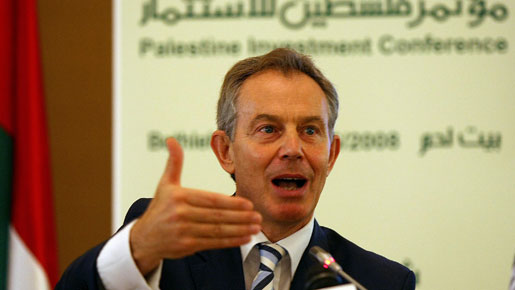
The Palestinian government and the private sector will host a three-day conference in Bethlehem from May 21 offering more than $1bn worth of projects to foreign investors.
The conference, part of efforts to boost the Palestinian economy as Palestinians take part in US-backed peace talks with Israel, follows a donor conference that in December attracted $7.7bn in aid pledges over the next three years.
In Abu Dhabi to support the meeting, the former British Prime Minister said he was working to get restrictions on movement that have squeezed the Palestinian economy, removed.
“The title of the conference is: you can do business in Palestine… It is true that the weight of the occupation is very heavy. It is true also that… we hope we can in the coming months start lifting the restrictions on access,” Blair said.
“It is true that all these political challenges make a difference to the Palestinian economy. It is also true therefore that if these challenges are met the possibilities are even greater… In Palestine today in the West Bank there are real opportunities for business.”
Blair said some projects already had the green light and tourism was up in Bethlehem versus a year ago, when he first became envoy for the Quartet of Middle East peace brokers – the United States, European Union, Russia and the United Nations.
But tourism levels are still 60-70 percent of their levels before the outbreak of the Palestinian uprising in 2000.
Prime Minister Salam Fayyad has said the Palestinian economy could grow over 10 percent in the next three years if Israel removes travel restrictions in the West Bank but projects a more modest six percent growth.
With Israel in control of Palestinian borders and the West Bank under Israeli occupation, it was not clear what assurances the Palestinian government could offer investors.
Israel has built up a network of hundreds of checkpoints and roadblocks in the West Bank, home to 2.5 million Palestinians, which it says stop suicide bombers reaching its cities.
Israel said in April it had removed 50 roadblocks as part of promises made to US Secretary of State Condoleezza Rice.
Hamas Islamists, who seized the Gaza Strip from Palestinian President Mahmoud Abbas’ secular Fatah forces in June and fire rockets at Israel, have also seen Israel tighten restrictions on the passage of people and goods to and from the territory.
Hassan Abu Libdeh, Palestine Investment Conference CEO, said that 25 percent of the projects on offer were in Gaza, though Abbas sacked the Hamas-led cabinet after it took over the area.
The cash-strapped government has so far received $500m of the total funds pledged at the December summit.
The United States relaunched the stalled peace process at a conference last November. Blair’s role has been to rebuild Palestinian institutions and get projects off the ground to show Palestinians that the peace process will reap dividends.
“What the Palestinian people need is support now. Support, of course politically, to get a just settlement for Palestine, but support also in how they build their state and secondly how they build their economy,” he said.

